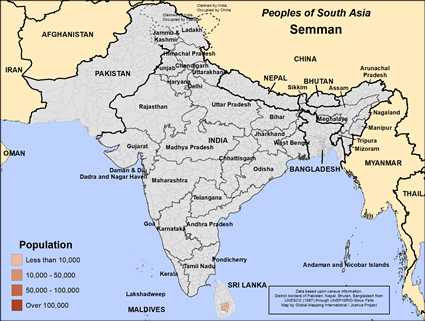The Semman people live in India, primarily in the southern states, including Tamil Nadu and Karnataka. Their history traces back to the early inhabitants of the region, with a long-standing connection to the land and traditional agricultural practices. Over the centuries, the Semman have adapted to various socio-political changes, while continuing to maintain their distinct identity within the broader cultural landscape of southern India.
The Semman people primarily engage in agriculture, cultivating crops such as rice, millet and vegetables. Many also work as laborers in nearby towns and cities, supplementing their income with seasonal work. Villages are typically small, with homes constructed from locally sourced materials like mud, brick and thatch. Social life revolves around family and community activities, with a strong emphasis on cooperation in agricultural tasks and communal events. While education access has improved, particularly in more accessible areas, challenges remain in remote regions where schools are often understaffed and under-resourced. Healthcare services are generally available, but disparities exist between urban and rural areas, leading to uneven access to medical care.
The Semman people predominantly practice Hinduism, which deeply influences their daily lives and spiritual practices. They worship a variety of Hindu deities, with particular reverence for gods and goddesses associated with agriculture and family welfare. Temples and local shrines play a central role in their religious activities, and festivals such as Pongal and Diwali are celebrated with community participation. Rituals and ceremonies mark important life events, and religious observance is closely tied to the agricultural calendar, reflecting their connection to the land and its cycles.
The Semman people face challenges related to economic opportunities, education and healthcare. Many still rely on subsistence farming and seasonal labor, with limited access to alternative sources of income. Educational facilities, while improving, are often inadequate in rural areas, leading to low literacy rates and limited opportunities for higher education. Healthcare services, though present, are often insufficient in remote villages, resulting in poor health outcomes and a reliance on traditional medicine. Infrastructure improvements, including better roads, sanitation, and access to clean water, are essential for enhancing their quality of life. Initiatives focused on sustainable development, education and healthcare are crucial for the long-term progress of the Semman people.
Pray that repentant leaders among the Semman people who have shed innocent blood will be able to worship him with abandon. Pray for joy and hope to define this community as the give their lives to Jesus Christ. Pray for loving and dedicated workers to disciple many.
Scripture Prayers for the Semman in India.
Southern India Cultural Studies. (2023). Ethnographic Overview of the Semman People. Retrieved from southernindiaculturalstudies.org
UNDP India. (2023). Development Needs of Rural Communities in Southern India. Retrieved from in.undp.org
| Profile Source: Joshua Project |












